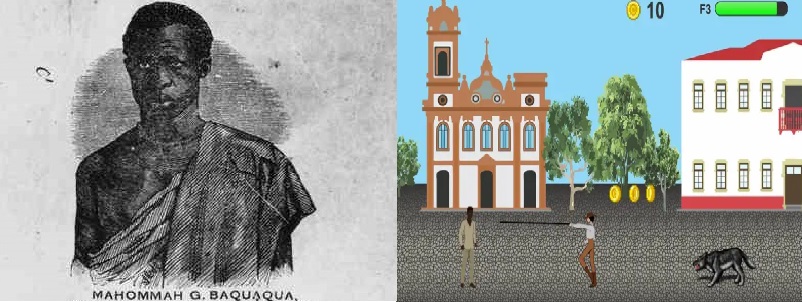
Coming up soon!
This project is led by Dr. Lucas Victor Silva, historian and Professor in the Department of Education at Universidade Federal Rural de Pernambuco (UFRPE), Rodrigo Lins Rodrigues, a Doctor in Computer Science and Professor in the Department of Education at UFRPE, and Paulo Alexandre da Silva, a teacher in the public school system of Pernambuco who holds an MA in History. The project aims to adapt the life of Mahommah Baquaqua into an educational game to bring his story to a wider school audience. The game will initially be available in Portuguese and later translated into English.
The game’s developers were high school students from the Joaquim Távora School of Reference in Secondary Education in the city of Recife, who participated either as scholarship recipients or volunteers. The project involved a concerted effort in design and technical-pedagogical supervision by the Departments of Computer Science and History at UFRPE through Brazil’s Institutional Program of Scientific Initiation Scholarships for high schools (PIBIC-EM). The digital game’s development was entirely carried out using the Stencyl game engine.
Mahommah Gardo Baquaqua, the real-life figure who inspires this digital game, lived a transatlantic journey that the game seeks to introduce to students. His autobiography offers a rare perspective from a former enslaved man, providing valuable insights into his life and experiences.
Born in the 1820s in Djougou, present-day Benin, Mahommah Baquaqua received an education in Islamic traditions. As a young boy, he apprenticed in his uncle’s workshop, and his promising future in trade seemed assured by his family ties in a bustling merchant city. However, his life took a dramatic turn when he was captured by Ashanti warriors during a trade caravan trip but was rescued by his brother. Despite returning to Djougou, Baquaqua was later enslaved and transported to Pernambuco (Brazil) after a harrowing journey on a slave ship.
Baquaqua’s ordeal continued as he endured mistreatment and frequent beatings by various enslavers. His ability to learn Portuguese and count led him to work as a bread seller, but his harsh conditions and despair drove him to attempt suicide. Eventually, Baquaqua seized an opportunity to escape during a trip to New York, encouraged by abolitionists and free blacks. After a brief imprisonment and help from American abolitionists, he lived as a fugitive before finding refuge in Port-au-Prince, Haiti. He struggled there but was rescued by missionaries who brought him back to the U.S. Baquaqua studied the Bible at New York Central College in McGrawville, strengthened ties with abolitionist groups, and planned to return to Africa as a Baptist missionary. His journey took him to Canada, where he became a British subject and published his autobiography. Despite his efforts to join missions to Africa, his trail ends in 1857 with no further information. Today, his biography is studied academically, has received media attention, and holds great educational potential.